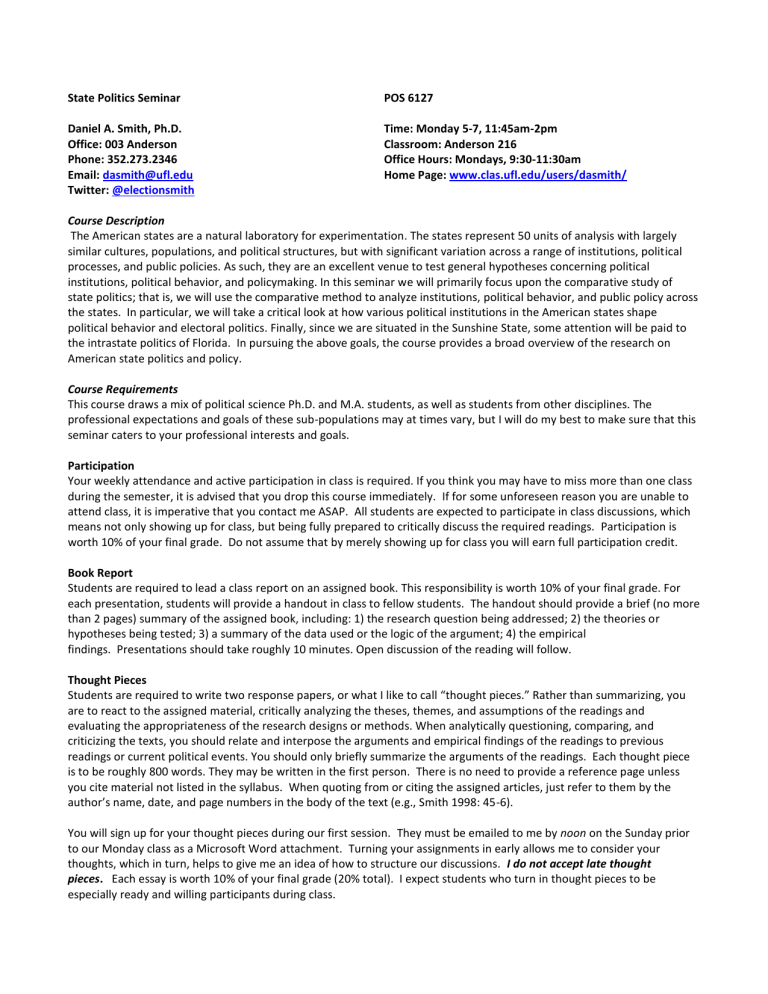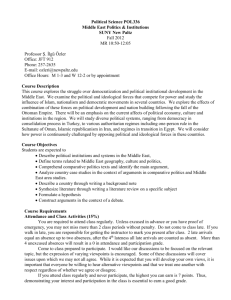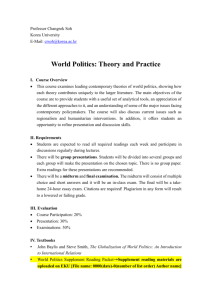The Politics of Reform
advertisement

State Politics Seminar POS 6127 Daniel A. Smith, Ph.D. Office: 003 Anderson Phone: 352.273.2346 Email: dasmith@ufl.edu Twitter: @electionsmith Time: Monday 5-7, 11:45am-2pm Classroom: Anderson 216 Office Hours: Mondays, 9:30-11:30am Home Page: www.clas.ufl.edu/users/dasmith/ Course Description The American states are a natural laboratory for experimentation. The states represent 50 units of analysis with largely similar cultures, populations, and political structures, but with significant variation across a range of institutions, political processes, and public policies. As such, they are an excellent venue to test general hypotheses concerning political institutions, political behavior, and policymaking. In this seminar we will primarily focus upon the comparative study of state politics; that is, we will use the comparative method to analyze institutions, political behavior, and public policy across the states. In particular, we will take a critical look at how various political institutions in the American states shape political behavior and electoral politics. Finally, since we are situated in the Sunshine State, some attention will be paid to the intrastate politics of Florida. In pursuing the above goals, the course provides a broad overview of the research on American state politics and policy. Course Requirements This course draws a mix of political science Ph.D. and M.A. students, as well as students from other disciplines. The professional expectations and goals of these sub-populations may at times vary, but I will do my best to make sure that this seminar caters to your professional interests and goals. Participation Your weekly attendance and active participation in class is required. If you think you may have to miss more than one class during the semester, it is advised that you drop this course immediately. If for some unforeseen reason you are unable to attend class, it is imperative that you contact me ASAP. All students are expected to participate in class discussions, which means not only showing up for class, but being fully prepared to critically discuss the required readings. Participation is worth 10% of your final grade. Do not assume that by merely showing up for class you will earn full participation credit. Book Report Students are required to lead a class report on an assigned book. This responsibility is worth 10% of your final grade. For each presentation, students will provide a handout in class to fellow students. The handout should provide a brief (no more than 2 pages) summary of the assigned book, including: 1) the research question being addressed; 2) the theories or hypotheses being tested; 3) a summary of the data used or the logic of the argument; 4) the empirical findings. Presentations should take roughly 10 minutes. Open discussion of the reading will follow. Thought Pieces Students are required to write two response papers, or what I like to call “thought pieces.” Rather than summarizing, you are to react to the assigned material, critically analyzing the theses, themes, and assumptions of the readings and evaluating the appropriateness of the research designs or methods. When analytically questioning, comparing, and criticizing the texts, you should relate and interpose the arguments and empirical findings of the readings to previous readings or current political events. You should only briefly summarize the arguments of the readings. Each thought piece is to be roughly 800 words. They may be written in the first person. There is no need to provide a reference page unless you cite material not listed in the syllabus. When quoting from or citing the assigned articles, just refer to them by the author’s name, date, and page numbers in the body of the text (e.g., Smith 1998: 45-6). You will sign up for your thought pieces during our first session. They must be emailed to me by noon on the Sunday prior to our Monday class as a Microsoft Word attachment. Turning your assignments in early allows me to consider your thoughts, which in turn, helps to give me an idea of how to structure our discussions. I do not accept late thought pieces. Each essay is worth 10% of your final grade (20% total). I expect students who turn in thought pieces to be especially ready and willing participants during class. Research Paper All students will write a substantial research paper for the course, worth 60% of your final grade. You have three options: 1) a original research paper (18-25 pages); 2) an in-depth, extended (20-25 pages) literature review on a given topic found in the syllabus; or 3) a 20-25 page research proposal/prospectus on your dissertation topic (for those thinking of writing dissertations on state politics). With my approval, you may co-author a research paper with another member of class. I also might be interested in collaborating with you on one of my ongoing research projects. I have lots of data (aggregate-level and individual), and I also have collected many archival materials that I will share with enterprising students who are interested in co-authoring. A two-page research prospectus is due in class on September 30. All students should meet with me during office hours prior to that time to discuss their research proposals. The prospectus must state your research question, your tentative argument and hypotheses, and any data and research methods you plan to use. You might also mention the normative implications of your research and any foreseeable limitations to your study. On November 25 and December 2, students will present their research in class (approximately 10 minutes for each paper). The final research paper is due on December 13, 2013, at 5pm; I need both a hard copy in my department mail box and an emailed MS Word attachment. UF Honor Code All students are expected to abide by the UF Honor Code, which reads, in part: “I affirm that this work in its entirety is mine alone, and that I have received no outside assistance from anyone else, including classmates, other students, or faculty. I understand that plagiarism, seeking or receiving other unauthorized assistance, or any false representations regarding this exam [or other work] are serious offenses punishable under the Student Honor Code.” Grading Class Participation 2 Thought Pieces Book Report Research Paper 10% 20% (10% each) 10% 60% Required Readings You will have to purchase a couple books or borrow them from the UF library. To access the articles that are required, click on the hypertext links within the on-line course schedule (for most of them, you must be logged into the UF system). I will make available to you any other readings. Course Schedule Week 1: Introduction to the Field August 26 (Sign-Up for Thought Pieces and Discussion Leaders) Readings: Jewell, “The Neglected World of State Politics” (1982) Mooney, “State Politics and Policy Quarterly and the Study of State Politics: The Editor’s Introduction” (2001) Nicholson-Crotty & Meier, “Size Doesn’t Matter: In Defense of Single-State Studies” (2002) Week 2: No Class (Labor Day) Sept 2 Week 3: Research Design (or, Learning How to Ask Interesting Questions and How to Answer Them) Sept 9 Readings (take your pick): Tova Wang, The Politics of Voter Suppression (2012) Richard Hasen, The Voting Wars (2012) Richard Scher, The Politics of Voter Disenfranchisement (2011) John Fund & Hans Von Spakovsky, Who’s Counting? How Fraudsters and Bureaucrats Put Your Vote at Risk (2012) Assignment: Drawing from any one of the four books, come to class with two or three possible research questions—and be prepared to offer a research design—to empirically test anecdotal claims made in the book . Think through your research design in both theoretical and generalizable terms, as we will discuss available empirical evidence to test your hypotheses. In class, will discuss the four books and will exchange research design ideas. This assignment does not commit you to a project, but should help us all think through how to design a research paper. Week 4: Diversity in the States Sept 16 Readings: Gray, “The Socioeconomic and Political Contexts of States,” in Gray, Hanson, & Kousser (eds.), Politics in the American States, 10th ed. (2013) Lieske, “The Changing Regional Subcultures of the American States and the Utility of a New Cultural Measure” (2011) Hero, “Social Capital and Racial Inequality in America” (2003) Smith & Fridkin, “Delegating Direct Democracy: Interparty Legislative Competition and the Adoption of the Initiative in the American States” (2008) Book Report: Gimpel and Schuknecht, Patchwork Nation: Sectionalism and Political Change in American Politics (2003) Elazar, American Federalism: A View from the States. 4th ed. (1984) Hero, Faces of Inequality: Social Diversity in American Politics. (2000) Week 5: Election Administration & Voting Sept 23 Readings: Berinksy, “The Perverse Consequences of Electoral Reform in the United States” (2005) Burden, et al., “Election Laws, Mobilization, and Turnout: The Unanticipated Consequences of Election Reform” (2013) Rigby & Springer, “Does Electoral Reform Increase (or Decrease) Political Equality?” (2010) Wolfinger, Highton, & Mulling, “How Postregistration Laws Affect the Turnout of Registrants” (2005) Barreto, et al.., “Do Absentee Voters Differ from Polling Place Voters?” (2006) Herron & Smith, “Precinct Closings and Wait Times during the 2012 General Election” (2013) Wand, Shotts, Sekhon, Mebane, Herron, & Brady, “The Butterfly Did It: The Aberrant Vote for Buchanan in Palm Beach County, Florida” (2001) Book Report: None Week 6: Primary Systems & Ballot Access Laws Sept 30 (Research Paper Prospectus Due in Class) Readings: McGhee, et al., “A Primary Cause of Partisanship?” (2013) Kaufmann, Gimpel, & Hoffman, “A Promise Fulfilled? Open Primaries and Representation” (2003) Norrander, et al., “Primary Type, Polarization of State Electorates” (2013) Miller & Krosnick, “The Impact of Candidate Name Order on Election Outcomes” (1998) Aldrich, “Southern Parties in State & Nation” (2003) Book Report: Key, Southern Politics in State and Nation (1949) Week 7: Campaign Finance Oct 7 Readings: LaRaja, “Why Super PACs” (2013) La Raja & Schaffner, "The Effects of Campaign Finance Spending Bans on Electoral Outcomes" (forthcoming) Werner & Mayer, “Public Election Funding, Competition, and Candidate Gender”(2007) Masket & Lewis, “A Return to Normalcy?” (2007) Hamm & Hogan, “Campaign Finance Laws and Candidacy Decisions in State Legislative Elections” (2008) Stratmann, “Do Low Contribution Limits Insulate Incumbents from Competition?” (2010) Book Report: La Raja, Small Change (2009) Week 8: Redistricting Oct 14 Readings: McDonald, “A Comparative Analysis of Redistricting Institutions in the United States, 2001-02” (2004) Lublin, Brunell, Grofman, & Handley, “Has the Voting Rights Act Outlived Its Usefulness: In a Word, ‘No’.” (2009) Barabas, & Jerit, “Redistricting Principles and Racial Representation” (2004) Lublin & Voss, “Racial Redistricting and Realignment in Southern State Legislatures” (2000) Shotts, “The Effect of Majority-Minority Mandates on Partisan Gerrymandering” (2001) Barreto, Segura, & Woods, “The Mobilizing Effect of Majority-Minority Districts on Latino Turnout” (2004) Book Report: Cox & Katz. Elbridge Gerry’s Salamander: The Electoral Consequences of the Reapportionment Revolution (2002) Brunell, Redistricting and Representation (2008) Week 9: Public Opinion, Ideology, & Partisanship Oct 21 Berry, et. al, “Measuring Citizen and Government Ideology in the U.S. States: A Re-Appraisal” (2010) Brace, Sims-Butler, Arceneaux, & Johnson, “Public Opinion in the American States: New Perspectives Using National Survey Data” (2002) Carsey & Harden, “New Measures of Partisanship, Ideology, and Policy Mood” (2010) Lax & Phillips, “The Democratic Deficit in the States” (2012) Lax & Phillips, “Gay Rights in the States: Public Opinion and Policy Responsiveness” (2009) Book Report: Erickson, Wright, & McIver, Statehouse Democracy: Public Opinion and Policy in the American States (1993) Week 10: Direct Democracy Oct 28 Haider-Markel, et al., “Win, Lose, or Draw?” (2007) Moore & Ravishankar, “Who Loses in Direct Democracy?” (2012) Donovan, Tolbert, & Smith, “Priming Presidential Votes by Direct Democracy” (2008) Smith & Tolbert, “Direct Democracy, Public Opinion, and Candidate Choice” (2009) Bowler, Nicholson, and Segura, “Earthquakes and Aftershocks: Race, Direct Democracy, and Partisan Change” (2006) Parry, Smith, & Henry, “The Impact of Petition Signing on Voter Turnout” (2011) Book Report: Smith & Tolbert, Educated by the Initiative (2004) Lewis, Daniel, Direct Democracy and Voting Rights (2011) Nicholson, Voting the Agenda (2005) Week 11: States Legislatures Nov 4 Readings: Wright & Schaffner, “The Influence of Party: Evidence from the State Legislatures” (2002) Meinke & Hasecke, “Term Limits, Professionalization, and Partisan Control in U.S. State Legislatures” (2003) Preuhs, “The Conditional Effects of Minority Descriptive Representation” (2006) Preuhs & Gonzalez-Juenke, “Latino U.S. State Legislators in the 1990s: Majority-Minority Districts, Minority Incorporation, and Institutional Position” (2011) Carey, et al., “The Effects of Term Limits on State Legislatures: A New Survey of the 50 States” (2006) Barrilleaux, Holbrook, & Langer “Electoral Competition, Legislative Balance, and American State Welfare Policy” (2002) Book Report: Rosenthal, The Decline of Representative Democracy: Process, Participation, and Power in State Legislatures (1998) Squire & Hamm, 101 Chambers: Congress, State Legislatures, and the Future of Legislative Studies (2005) Week 12: No Class (Veterans Day) Nov 11 Week 13: Governors & the Courts Nov 18 Readings: Brown, “Are Governors Responsible for the State Economy? Partisanship, Blame, and Divided Government” (2010) Atkeson & Partin, “Economic and Referendum Voting: A Comparison of Gubernatorial and Senatorial Elections” (1995) Gann Hall, “State Supreme Courts in American Democracy: Probing the Myths of Judicial Reform” (2001) Brace & Boyea, “State Public Opinion, the Death Penalty, and the Practice of Electing Judges” (2008) Bonneau & Rice, “Impartial Judges? Race, Institutional Context, and U.S. State Supreme Courts” (2009) Book Report: Kousser & Phillips, The Power of American Governors (2012) Bonneau & Hall, In Defense of Judicial Elections (2009) Weeks 14 & 15: Research Presentations Nov 25 & Dec 2 Dec 13: Research Papers Due (emailed as an MS Word attachment), by 5pm. Copyright © by Author, Daniel A. Smith, 2013









